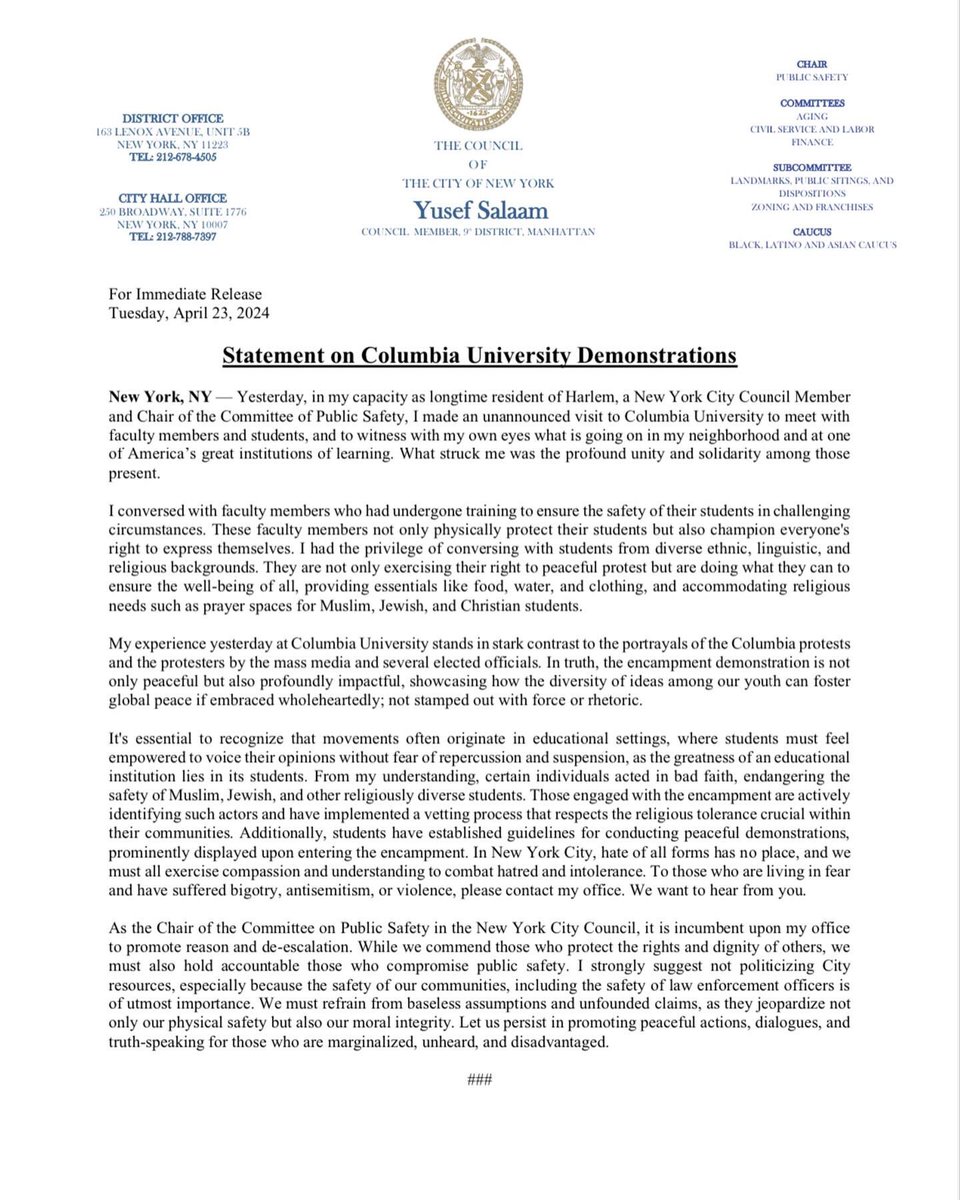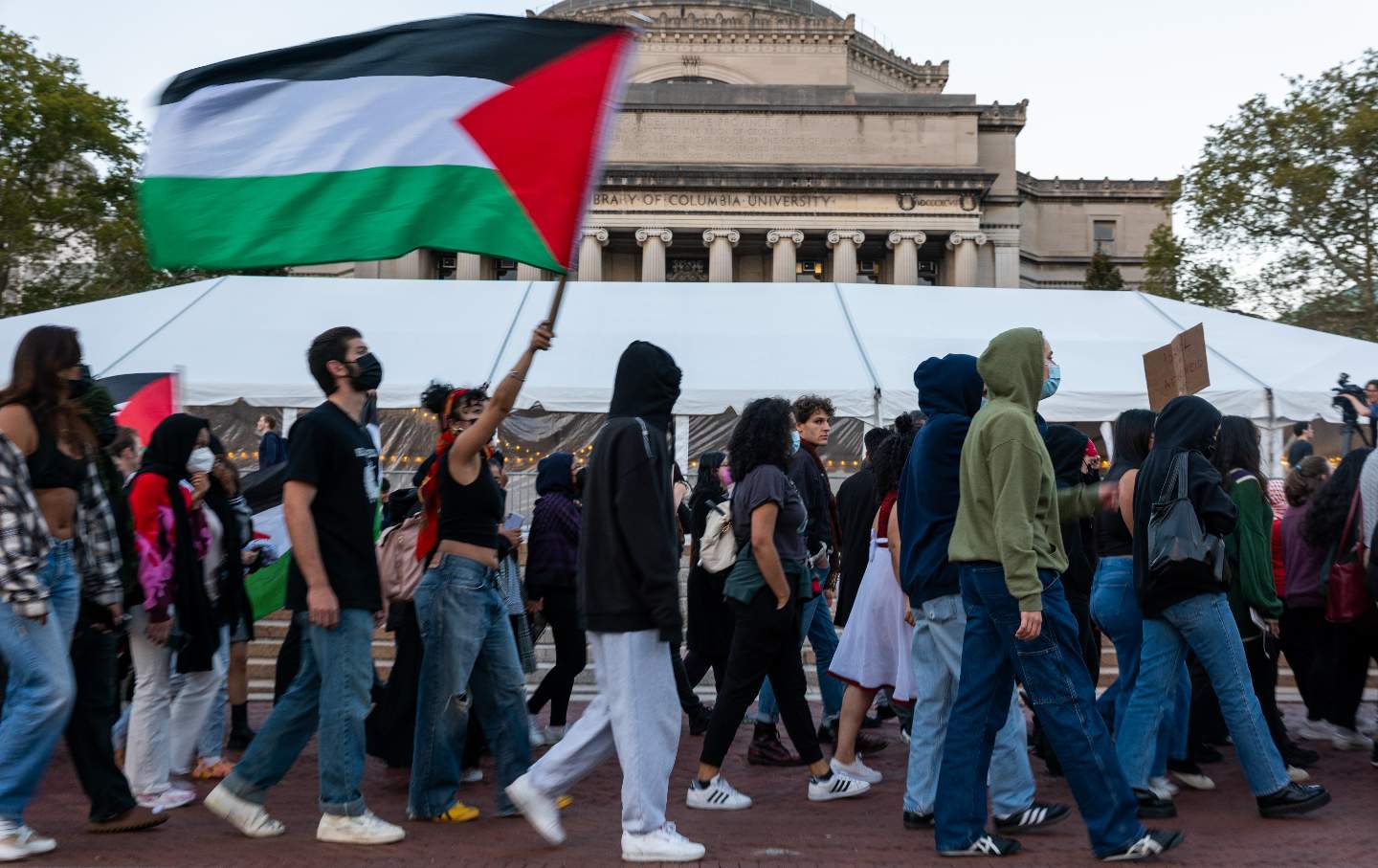If you’ve been following the news lately, you’ve noticed that there are students nationwide protesting against the Palestinian genocide and the subsequent pushback they receive from their university admin calling in police forces. In Columbia University’s case, a peaceful encampment protest apparently required over two hundred arrests and the SWAT team. This article will explain the events that occurred, how student rights are being denied, and how the media is misrepresenting the protesters.
Timeline
On April 18th, the students at Columbia University set up an encampment protest in solidarity with Palestine, advocating for a ceasefire and humane treatment of Palestinians, and demanding that the Board of Trustees divest from Israel. Columbia’s president Nemat “Minouche” Shafik responded by requesting the presence of the NYPD, sending a letter that branded the student protesters as ‘dangerous’, saying that “the encampment and related disruptions pose a clear and present danger to the school” (Treisman, 2024). The NYPD then broke up the encampment and arrested over 100 students. NYPD’s Chief of Police John Chell wanted to make known that the arrests were made for trespass and the ‘clear and present danger’ was identified by Columbia and not NYPD (McKee, 2024). After this, the Gaza encampment continued, and negotiations between students and admin began. The demands from the students were as follows: Divestment1 from Israel and the companies that support it, financial transparency from the University, and amnesty for the student protesters. These negotiations came to a halt on April 29th, and Columbia issued a warning that the encampment must be abandoned by 2 pm, and any students who did not comply were suspended.
This sparked a sit-in at Hamilton Hall on Columbia’s campus on April 30th, where students outraged at the university’s treatment of protesters barricaded themselves inside. The university entered a lockdown and the NYPD stormed the building and made 112 arrests. At this point, over 1,000 student protesters have been arrested at several college campuses nationwide. While Shafik received backlash for her treatment of these students, she remains firm in her decisions. The students also stand their ground even as many students are suspended and arrested, and the commencement ceremony scheduled for today has been canceled.
“Those of us in Gaza Solidarity Encampment will not be intimidated, we will stand resolute until our demands are met”
Isra Hirsi, a student suspended from Columbia University
False Narrative
Because of the mischaracterization of the Pro-Palestine protests, they are being labeled as antisemitic and hateful. Even President Joe Biden said that he “condemn[s] the antisemitic protests” and that this ‘alarming surge’ of antisemitism “has absolutely no place on college campuses or anywhere in this country” (Kim, 2024). While antisemitism and Jewish hate are unacceptable, it must be noted here that antisemitism has no place in the Palestine protests either. Supporters of Palestine stand against Israel and its actions, but antisemitism has never been a principle of the demonstrations. There were students of all faiths at the Columbia encampments, some even praying together. New York City Council member Yusef Salaam released a statement about his visit to the Columbia encampments, saying that he saw “profound unity and solidarity among those present” and that the students were “accommodating religious needs such as prayer spaces for Muslim, Jewish, and Christian students” (Salaam, 2024).

Perspective From Columbia Students
Despite the villainization of the protesters and Columbia administration’s ‘good cop’ angle, Columbia students want to try and take back control of the narrative and for the public to know the truth of the events. A group of student protesters, elected to represent the student body, told their story through an article published by the Guardian (the only new source that accepted this piece). According to this article, the tension between Pro-Palestine students and Columbia admin when the latter created and passed an event policy that granted the administration sole discretion to regulate protests, which goes against rules of university conduct outlined in the university statutes. Furthermore, chapters of Jewish Voice for Peace and Students for Justice in Palestine were suspended for “threatening rhetoric and intimidation” (Statement From Gerald Rosberg, Chair of the Special Committee on Campus Safety, 2024). Statements made by extremists degrading Jewish student protesters (calling them terrorists and Judenrat) and glorifying the October attack went undisciplined, and the task force assembled to combat antisemitism on campus did not include student voices. Columbia admin created and perpetuated a narrative characterizing the student protesters as violent extremists, and yet these students upheld community and university guidelines that “[disavow] all forms of hate”. Students at these encampments were peaceful and non-violent; they were singing, dancing, making music and art, praying together, and advocating for peace. These students have been failed by their university faculty and administration.
When Columbia President Shafik called the NYPD, it went against a unanimous veto by the university senate executive committee, who are required to be consulted before requesting police presence and escalated tensions between both parties. During the Hamilton Hall lockdown, students were unable to access medical assistance, food, and other necessary resources, and legal observers and EMTs were denied access to campus, due to the shelter-in-place. Swat and strategic response teams used excessive force on this isolated group of students and limited documentation, a common tactic employed to deny police brutality. This all occurred during finals week, no less. It stands that while the Columbia administration claims to value its students’ safety, well-being, and academia, its actions prove detrimental to students, even non-participants. While Columbia students are being silenced, they unwaveringly maintain their demands and ask that their voices be heard, so that they can amplify the cries from Palestine.
A Message to the Viewers
Although the treatment of student protesters is disheartening, I hope that viewers are not discouraged from fighting for what they believe in and advocating for those who cannot advocate for themselves. Palestine is in need. Student protests have been met with mischaracterization and police brutality for years, all the way back to Civil Rights and Anti-War Vietnam demonstrations. Columbia’s protests for divestment from the South African Apartheid were successful, and a year after the demonstrations Columbia became the first Ivy League school to divest from companies that supported the apartheid (MSN, n.d.). Let this be a reminder that students can and should mobilize for causes that they care about and that they can be effective. Causes like these demand sacrifices, and speaking out will always garner negative attention, but be firm in your resolution and understand that it is well within your rights as a student to protest peacefully.
- University divestment from Israel would be removing financial support and investments from companies that support Israel, including weapons manufacturing companies. If you are a college student, do your research and see where your tuition money is going. ↩︎
